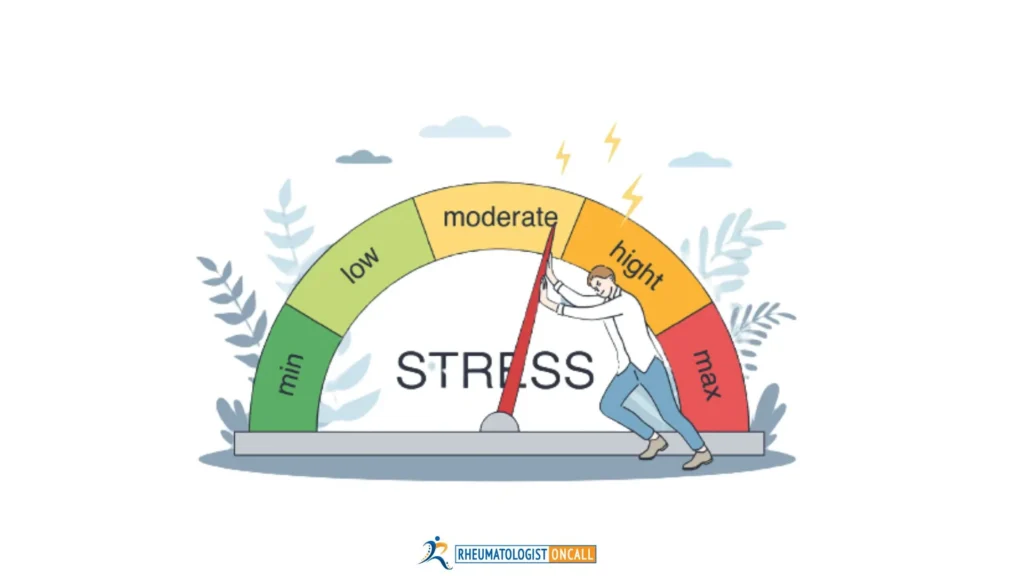SHARE
Living with Rheumatoid Arthritis (RA) poses daily challenges. The joint pain, fatigue, disability, and treatment demands take a major physical and emotional toll. Research clearly shows chronic stress significantly worsens Rheumatoid Arthritis inflammation and pain. Although removing stress from our lives is nearly impossible, learning to minimize stress is essential for optimal disease control.
This article will explore the links between stress and Rheumatoid Arthritis (RA) flares. You’ll learn proven techniques to reduce the effects of stress and improve your life quality with Rheumatoid Arthritis (RA).
Understanding the Stress-Inflammation Connection
When we experience acute stress, the hypothalamus signals the adrenal glands to release hormones like cortisol and adrenaline. This triggers the “fight or flight” response – increased heart rate, blood pressure, and energy production. Inflammation rises to maximize immunity.
These reactions are helpful just for short-term threats. But with rheumatoid arthritis, the daily struggles of pain, disability, treatment demands, work issues, and relationship problems lead to prolonged elevated stress.
Studies demonstrate chronic stress:
- Increases inflammatory cytokines like IL-6, TNF-a, and CRP
- Worsens Rheumatoid Arthritis symptoms, including pain, fatigue, stiffness, and disability
- Triggers more frequent inflammatory arthritis flares
- Reduces the effectiveness of Rheumatoid Arthritis medications
- Contributes to anxiety, depression, muscle tension, insomnia, and poor concentration
Finding healthy ways to minimize the impact of stress is imperative for controlling Rheumatoid Arthritis inflammation and protecting mental health.
Identifying Your Biggest Stress Triggers
While some situations seem universally stressful, factors like genetics, upbringing, and thought patterns influence people’s resilience. Learn that there are situations that you may control while others you may not.
Take time to reflect on which situations elevate your stress most.
Is it a pain flare?
Medical costs?
Relationship issues?
Work problems?
Talking to a counselor to gain insight into your unique stressors might be worthwhile.
Common Rheumatoid Arthritis Stressors
Some typical stress triggers for Rheumatoid Arthritis patients include:
- Dealing with constant joint pain, fatigue, disability
- Loss of independence and inability to be as active
- Juggling frequent doctor visits and complex treatments
- Worrying about medical costs and missed work time
- Partners misunderstanding invisible Rheumatoid Arthritis symptoms
- Fears about the unpredictability of inflammatory flares
- Anger, anxiety, sadness about having a chronic condition
By recognizing situations that increase your stress, you can proactively use coping techniques to minimize the effects on your rheumatoid arthritis.
10 Ways to Reduce the Impact of Stress on Rheumatoid Arthritis

While we can’t eliminate all stress, we can implement strategies to reduce its effects on rheumatoid arthritis:
1- Relaxation practices – Activities like yoga, meditation, deep breathing, and guided imagery help activate the body’s relaxation response. This lowers blood pressure, heart rate, and stress hormones. Practice these calming techniques at least 15-20 minutes daily. Apps like Calm can guide you. Massage – Therapeutic massage lowers stress hormones and relieves muscle tension. Aromatherapy – Scents like lavender and bergamot promote relaxation.
2- Enjoyable hobbies – Make time daily for hobbies you find absorbing and soothing, such as reading, birdwatching, gardening, or dancing. Enjoyable activities boost mood and provide a mental break from daily stressors. Spend time in nature- Spend time outside walking or just sitting. Nature is calming.
3- Moderate exercise – Physical activity naturally reduces anxiety and tension. Aim for 30-60 minutes of moderate exercise like walking, swimming, cycling, or tai chi most days. Moving your body releases feel-good endorphins.
4- Supportive community – Connecting with other Rheumatoid Arthritis patients provides validation and stress relief. Join an in-person or online community to share experiences and advice. Don’t underestimate the power of feeling understood. Laugh – Watch a funny show, read humor, and hang with friends who make you laugh. Laughter is medicinal.
5- Healthy lifestyle – Eating a nutritious anti-inflammatory diet and limiting alcohol supports physical and mental health. Caring for your overall well-being builds resilience to stress.
6- Reframing thoughts – If you tend to catastrophize or think negatively, work with a therapist to identify cognitive distortions and intentionally reframe your thoughts. Be compassionate to yourself. Start a gratitude journal.
7- Sleep well and enough – chronic sleep deprivation increases fatigue, and brain fog increases pain. Patients in pain tend to sleep less; the next day, they experience more pain. Be consistent with your sleep schedule and get nightly 7-9 hours of sleep.
8- Medications – If anxiety or depression symptoms interfere with daily life, antidepressants or anti-anxiety meds under a doctor’s care may be helpful. Never stop medications abruptly.
9- Communicate needs – Have open discussions with loved ones explaining your limitations and how they can best support you. Keeping relationships strong is calming.
10- Rheumatology care team – Seeing doctors who listen attentively and involve you in treatment decisions reduces healthcare-related stress. Communicate any treatment concerns early.
Controlling Stress for Better Rheumatoid Arthritis Management
Learning stress management skills is imperative for Rheumatoid Arthritis patients. Lowering stress minimizes inflammatory flares and protects mental health. Managing stress should be part of your overall treatment plan.
While some stress is inevitable with a chronic condition, reducing unnecessary tension from other aspects of life provides empowerment. Find relaxation techniques that fit your personality. Controlling stress enables you to live better with Rheumatoid Arthritis.
For a personalized approach to your Rheumatoid Arthritis care, contact Rheumatologist OnCall.














